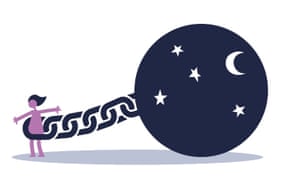Seanko
Well-Known Member
The British newspaperthe Guardian has published a piece on as part of their series "What I'm really thinking..." on ME.
What I'm really thinking: the ME Patient

"I have myalgic encephalomyelitis. If you think it is hard to say, try living with it every day.
Yes, I understand that your aunt had chronic fatigue, and that she took some B-vitamins and is all-better now. No, it isn’t adrenal fatigue because that doesn’t exist. Oh yes, how fantastic that your friend’s friend was really tired after a virus, but she tried acupuncture and cut out wheat and dairy from her diet and next week she is running the London marathon.
I don’t have what they probably had, you see, because only 5% of people recover from myalgic encephalomyelitis. It is sometimes called chronic fatigue syndrome, but that’s a bit of a misnomer. I’m not just tired. The paralysis was the first worry. Then all the muscle pain. Then the memory loss. Then losing the ability to speak without stuttering. I started to forget what words meant. Or who my boyfriend was. Then the fatigue came to kick me when I was down. Then the nausea. Then the constant, unrelenting joint pain, headaches, and flu-like symptoms.
Ah yes, I know. You were so tired last weekend, you just fell asleep on the sofa. But were you so tired that you slept solidly for 22 hours and then spent an hour getting from your bedroom to the bathroom and back again before sleeping for another 22 hours? I thought not.
I’ve improved a lot in eight years. But I’ve been told this is as good as it gets. I will never recover unless medicine has a breakthrough. And I have accepted that, so why can’t you? I appreciate your sympathy. Your advice and suggestions are well meant. But please, back off."
What I'm really thinking: the ME Patient

"I have myalgic encephalomyelitis. If you think it is hard to say, try living with it every day.
Yes, I understand that your aunt had chronic fatigue, and that she took some B-vitamins and is all-better now. No, it isn’t adrenal fatigue because that doesn’t exist. Oh yes, how fantastic that your friend’s friend was really tired after a virus, but she tried acupuncture and cut out wheat and dairy from her diet and next week she is running the London marathon.
I don’t have what they probably had, you see, because only 5% of people recover from myalgic encephalomyelitis. It is sometimes called chronic fatigue syndrome, but that’s a bit of a misnomer. I’m not just tired. The paralysis was the first worry. Then all the muscle pain. Then the memory loss. Then losing the ability to speak without stuttering. I started to forget what words meant. Or who my boyfriend was. Then the fatigue came to kick me when I was down. Then the nausea. Then the constant, unrelenting joint pain, headaches, and flu-like symptoms.
Ah yes, I know. You were so tired last weekend, you just fell asleep on the sofa. But were you so tired that you slept solidly for 22 hours and then spent an hour getting from your bedroom to the bathroom and back again before sleeping for another 22 hours? I thought not.
I’ve improved a lot in eight years. But I’ve been told this is as good as it gets. I will never recover unless medicine has a breakthrough. And I have accepted that, so why can’t you? I appreciate your sympathy. Your advice and suggestions are well meant. But please, back off."
Last edited:












